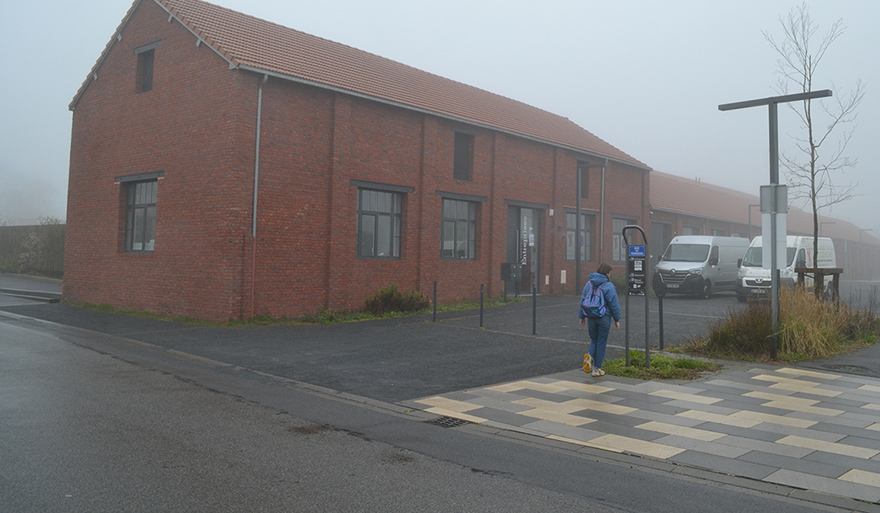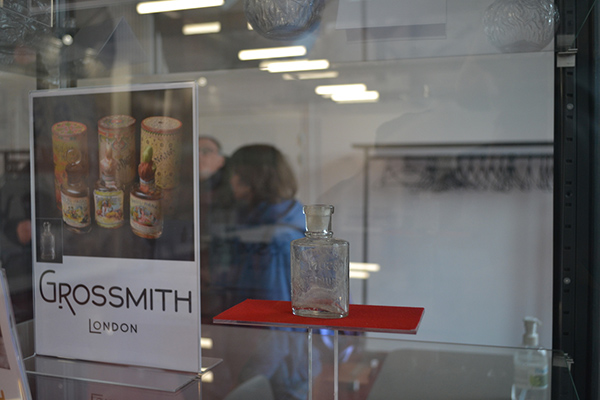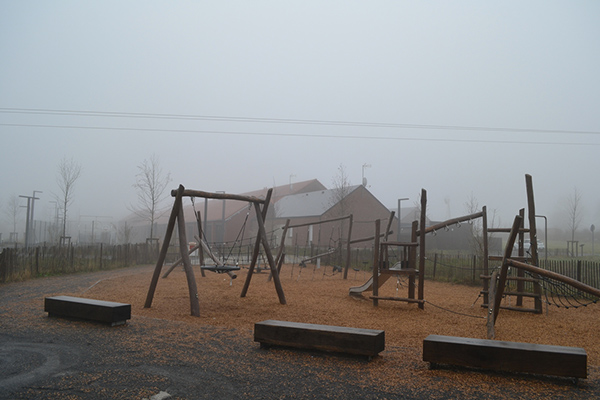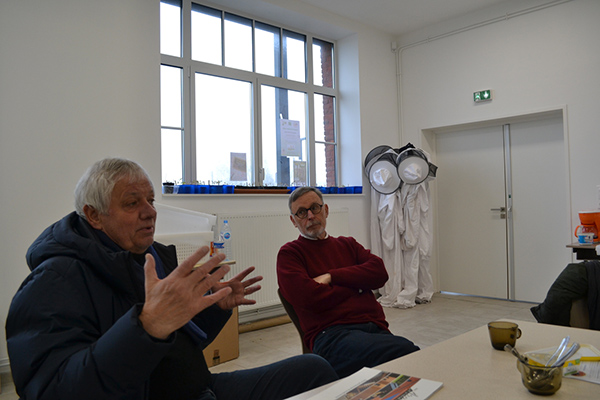Up north were the corons
Anor, a small town in Nord-pas-de-calais, had five factories and a dolphinarium. All have closed, and the municipality is trying to restore the old buildings left to decay. A tale of the Verrerie district, from a decrepit coron to an eco-neighbourhood.

Anor (France)
His friends no longer know how old Michel Faustier is. Sitting at the back of the only bar in Anor, he remembers with dreamy eyes the past life of his native village, formerly an industrial powerhouse with five companies and a dolphinarium. Michel used to live in the Verrerie Blanche district. where transparent glass bottles were made, in a red brick factory town typical of the working class estates of northern France. "Leaving, returning, it was endless" he says of the wagons that supplied the factory.
Today, the long structure houses a modern complex where residents, micro-businesses, associations and school groups exist side by side. Life has not always been easy for the people of La Verrerie Blanche. Michel and his four friends met several decades ago. At that time they lived in the workers' houses adjoining the main building. The walls were made of brick and cob, and failed to prevent temperatures of "minus twenty, minus twenty-two degrees". Yet they had "never lacked for anything". Their wealth was their five factories. "If I didn't want to work in my factory anymore, I could just move to the one opposite," Michel explains with a smile.
Work so easy to find is now a distant dream. All the factories have closed down, and unemployment employs the most. In Anor, it’s reached 22 percent. The five friends have seen the Verrerie Blanche neighbourhood fall into disrepair and decrepitude. Living conditions have deteriorated. "Nothing like what’s here now," says Hocin, the youngest of the group.
The reconstruction of the neighborhood
Jean-Luc Perrat, the current mayor and former PE teacher, had been thinking about creating an eco-neighbourhood for several years when a call for projects was opened to the whole of Nord-Pas-de-Calais. The European ERDF fund was to be divided between several towns in the region.
The village hit the jackpot. Work is underway. Many glass pieces, among other treasures, have been unearthed during these unintended excavations. London business Grossmith was a "titan of the European perfume industry in the 1900s.” They lost everything in the Second World War. With their archives destroyed, the company lost its memory. Glass bottles found in Anor explain the connection between the family business and the small village. A large hall serves as a museum featuring these finds and archive photos.

Two years later, the miner’s cottage is still there, but everything else has changed. Houses with garages and gardens have replaced the workers' houses; playgrounds and a town stadium have sprung up; companies and associations have set up shop. Between the railway and the hedgerows, an American-style neighbourhood has replaced the decrepit houses.
"We had three times as many requests as places," thrills the mayor. Thirteen families now live here, partly in rent-to-buy accommodation so that even the most precarious residents can become homeowners. Soon, a béguinage will accommodate older people. "I've already reserved my house," enthuses Marc Frumin, the deputy mayor nearing retirement, already imagining himself there. He has put a lot of effort into the project.
The enthusiasm is not uncommon. Audrey has just arrived in her new home. The young housewife is delighted. "Our old flat was the size of the living room," she laughs. Now her husband and two daughters have two floors, a basement and a large garden. The insulation, above all, is "high tech". It's nothing like the cob that was there before. His two daughters are at home because the older one is ill. The two little ones jump from the sofa to the carpet and roll around. Is the garden enough for all their energy? "Not really, it rains a lot," she admits, looking out the window at the drizzle. "More in the summer." Her daughter proudly shows off her room upstairs. She has tidied it up for the occasion. Her favourite item is the unicorn picture above her dresser.

The new neighbourhood has brought some peace and quiet. Audrey's sister lives on the other side of the tracks, in the Verrerie noire district. A very low passageway, which you can only cross with your back bent, connects the two districts. At first sight, they couldn’t be more different. The houses are dirty, the playground is untended, the fences have been torn down. "There is often trouble between neighbours", Audrey remarks.
In the new neighbourhood, where the inhabitants are still getting to know each other, there are no such problems. Even if for the time being barbecues are mostly family affairs in private gardens, the little family have played "chicken coop" with Mr Frumin. Now all it takes to make the youngest daughter smile with all her baby teeth is to say “chick”.
Activities still struggle to find a public
These activities are at the heart of the municipal majority's project. The mayor decided to keep the skeleton of the coron (or miner’s cottage) as it was. He wanted to pay tribute to the workers - "our parents, grandparents and great-grandparents" - but also a vanished way of life. "Before, people would garden when they weren’t working," he explains, nostalgically. "I come from a family of five boys. My father, when he came home from work, would change his clothes and go and do his garden." He wanted to bring in "something extra" for his family.
In a village with such a staggering unemployment rate, Jean-Luc Perrat would very much like to see these old ways revived. That's why he commissioned Marc Frumin to give a new lease of life to the neighbourhood. More family-oriented, closer to nature, the neighbourhood has been awarded the "eco-neighbourhood" label for its democratic and ecologically minded activities. Every Saturday, "seven or eight of us get together and we grow permaculture crops - onions, shallots and garlic", says the assistant gardener. All residents can harvest whenever they want.

Despite the best efforts, the community is still slow to show interest. "We still haven't found one or two families to climb aboard," admits Jean-Luc Perrat. "You're not born to participate," he reasons. Now, since the chickens were attacked, Mr Frumin has not relaunched the project. No family is motivated enough to take responsibility. Regardless, the mayor and his deputy have not lost hope - they know that their ambition is big, and that only time can give rise to new habits.
 This article was produced as part of the Union Is Strength competition, organised by Slate.fr with the financial support of the European Union. The article reflects the views of the author and the European Commission cannot be held responsible for its content or use.
This article was produced as part of the Union Is Strength competition, organised by Slate.fr with the financial support of the European Union. The article reflects the views of the author and the European Commission cannot be held responsible for its content or use.